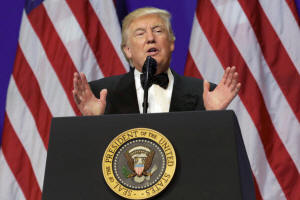|
Trump expected to order temporary ban on
refugees
 Send a link to a friend
Send a link to a friend
 [January 25, 2017]
By Julia Edwards Ainsley [January 25, 2017]
By Julia Edwards Ainsley
WASHINGTON (Reuters) - U.S. President
Donald Trump is expected to sign executive orders starting on Wednesday
that include a temporary ban on most refugees and a suspension of visas
for citizens of Syria and six other Middle Eastern and African
countries, say congressional aides and immigration experts briefed on
the matter.
Trump, who tweeted that a "big day" was planned on national security on
Wednesday, is expected to ban for several months the entry of refugees
into the United States, except for religious minorities escaping
persecution, until more aggressive vetting is in place.
Another order will block visas being issued to anyone from Syria, Iraq,
Iran, Libya, Somalia, Sudan and Yemen, said the aides and experts, who
asked not to be identified.
In his tweet late on Tuesday, Trump said: "Big day planned on NATIONAL
SECURITY tomorrow. Among many other things, we will build the wall!"
The border security measures probably include directing the construction
of a border wall with Mexico and other actions to cut the number of
illegal immigrants living in the United States.
The sources say the first of the orders will be signed on Wednesday.
With Trump considering measures to tighten border security, he could
turn his attention to the refugee issue later this week.
Stephen Legomsky, who was chief counsel at U.S. Citizenship and
Immigration Services in the Obama administration, said the president had
the authority to limit refugee admissions and the issuance of visas to
specific countries if the administration determined it was in the
public’s interest.

"From a legal standpoint, it would be exactly within his legal rights,"
said Legomsky, a professor at Washington University School of Law in St.
Louis. "But from a policy standpoint, it would be terrible idea because
there is such an urgent humanitarian need right now for refugees.”
The Republican president, who took office last Friday, was expected to
sign the first of the orders at the Department of Homeland Security,
whose responsibilities include immigration and border security.
On the campaign trail, Trump initially proposed a temporary ban on
Muslims entering the United States, which he said would protect
Americans from jihadist attacks.
Both Trump and his nominee for attorney general, Senator Jeff Sessions,
have since said they would focus the restrictions on countries whose
migrants could pose a threat, rather than a ban on those of a specific
religion.
Many Trump supporters decried former President Barack Obama's decision
to increase the number of Syrian refugees admitted to the United States
over fears that those fleeing the country's civil war would carry out
attacks.
LEGAL CHALLENGES POSSIBLE
Detractors could launch legal challenges if all the countries subject to
the ban are Muslim-majority nations, said immigration expert Hiroshi
Motomura at UCLA School of Law.
Legal arguments could claim the executive orders discriminate against a
particular religion, which would be unconstitutional, he said.
"His comments during the campaign and a number of people on his team
focused very much on religion as the target," Motomura said.
To block entry from the designated countries, Trump is likely to tell
the State Department to stop issuing visas to people from those nations,
according to sources familiar with the visa process. He could also
instruct U.S. Customs and Border Protection to stop any current visa
holders from those countries from entering the United States.
White House spokesman Sean Spicer said on Tuesday the State and Homeland
Security Departments would work on the vetting process once Trump's
nominee to head the State Department, Rex Tillerson, is installed.
[to top of second column] |

President Donald Trump speaks at the Armed Services Ball in
Washington, U.S., January 20, 2017. REUTERS/Yuri Gripas

Other measures may include directing all agencies to finish work on
a biometric identification system for non-citizens entering and
exiting the United States and a crackdown on immigrants fraudulently
receiving government benefits, according to the congressional aides
and immigration experts.
To restrict illegal immigration, Trump has promised to build a wall
on the U.S.-Mexico border and to deport illegal migrants living
inside the United States.
Trump is also expected to take part in a ceremony installing his new
secretary of homeland security, retired Marine General John Kelly,
on Wednesday.
AUSTRALIA DEAL UNDER THREAT
Trump's executive order threatens a refugee resettlement deal with
Australia signed late last year, and could leave more than 1,000
asylum seekers in limbo.
The U.S. agreed to resettle an unspecified number of refugees being
held in Papua New Guinea (PNG) and the tiny South Pacific island
nation of Nauru on Australia’s behalf, under a deal to be
administered by the U.N. refugee agency.
"Any substantial delay in the relocation of refugees...would be
highly concerning from a humanitarian perspective," Catherine
Stubberfield, a spokeswoman of the U.N. High Commissioner for
Refugees, told Reuters by email.
"These men, women and children can no longer afford to wait."
The deal followed agreement by Australia in September to join a
U.S.-led program to resettle refugees from Guatemala, Honduras and
El Salvador as part of its annual intake.
Australia's tough border security laws mandate that asylum seekers
intercepted trying to reach the country by boat go for processing to
detention camps on PNG's Manus island and Nauru.
Australia does not provide information on the nationalities of those
held, but around a third of the 1,161 detainees were from countries
covered by the executive orders, lawyers and refugee workers for the
asylum seekers told Reuters.

"We already didn't have much hope the U.S. would accept us," Behrouz
Boochani, an Iranian refugee who has spent more than three years on
Manus island, told Reuters.
"If they do not take us, Australia will have to."
A spokeswoman for Australia's Prime Minister Malcolm Turnbull
declined to comment.
(Reporting by Julia Edwards Ainsley; Additional reporting by Mica
Rosenberg; Additional reporting by Colin Packham in Sydney; Editing
by Leslie Adler and Clarence Fernandez)
[© 2017 Thomson Reuters. All rights
reserved.]
Copyright 2017 Reuters. All rights reserved. This material may not be published,
broadcast, rewritten or redistributed. |